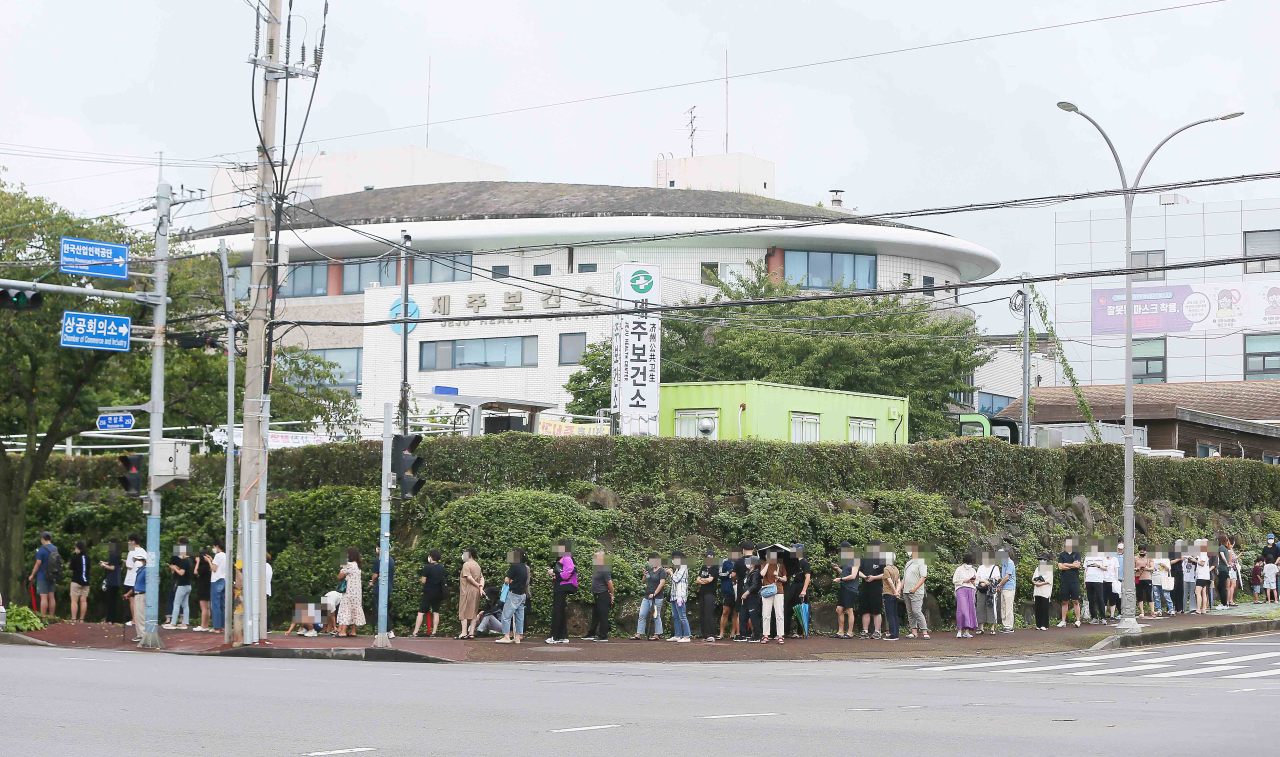 |
People wait to be tested at a COVID-19 testing station on the country's southern island of Jeju on Monday, with the country reporting 1,418 new cases on the day. (Yonhap) |
South Korea's daily new coronavirus fell below 1,500 on Monday due to fewer tests over the weekend, as health authorities extended the toughest virus curbs for another two weeks to battle the worst wave of the pandemic.
The country added 1,418 more COVID-19 cases, including 1,370 local infections, raising the total caseload to 237,782, according to the Korea Disease Control and Prevention Agency (KDCA).
Monday's tally was down from 2,052 on Friday, 1,880 on Saturday and 1,628 on Sunday.
But the decline was attributable to less testing over the weekend. Daily cases, which have surged during weekdays, surpassed 1,000 on July 7 and have stayed above the mark for 48 days in a row.
The country added seven more deaths from COVID-19, raising the death toll to 2,222, the KDCA said.
Despite six weeks of the toughest restrictions in the greater Seoul area, the fourth wave of the pandemic has shown no signs of abating as the highly contagious delta-driven infections have complicated antivirus measures.
The wider Seoul area, where half of the nation's 52 million population lives, has been under Level 4 restrictions, the highest of the four-tier virus curbs, for the past six weeks, while most other areas have implemented Level 3 distancing for the last four weeks.
The current social distancing measures were extended Monday until Sept. 5.
Under the tougher measures, restaurants and cafes will be required to close at 9 p.m., an hour earlier than the current nighttime curfew. The semi-lockdown measures prohibit gatherings of more than two people after 6 p.m., and ban the operation of nightclubs and other entertainment venues.
As of Monday, 25.91 million people, or 50.5 percent of the population, have received their first shots of COVID-19 vaccines, and 11.56 million people have been fully vaccinated, the KDCA said.
The government aims to vaccinate at least 70 percent of the nation's population by September to create herd immunity in November.
Sohn Young-rae, a senior health official, told reporters that the government could achieve the vaccination target, saying that about half of the nation's population will be fully vaccinated by September.
Sohn urged people to get COVID-19 shots because a vaccine limits the severity of infections, while cases of breakthrough infections are still rare.
Currently, the people who are being infected with COVID-19 are mostly unvaccinated, Sohn said, describing the fourth wave as an "unvaccinated pandemic."
Of the newly confirmed domestic cases, 383 were from Seoul, 392 from the surrounding Gyeonggi Province and 72 from the western port city of Incheon, the authorities said.
The southeastern port city of Busan identified 63 new patients, and North Gyeongsang Province had 34 more, they said.
The number of patients with serious symptoms across the country reached 399, it said.
The total number of people released from quarantine after making full recoveries was 207,601, up 1,325 from the previous day. (Yonhap)








